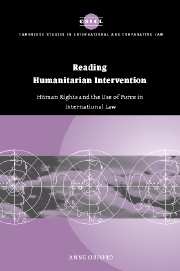Book contents
- Frontmatter
- Contents
- Preface
- 1 Watching East Timor
- 2 Misreading the texts of international law
- 3 Localizing the other: the imaginative geography of humanitarian intervention
- 4 Self-determination after intervention: the international community and post-conflict reconstruction
- 5 The constitution of the international community: colonial stereotypes and humanitarian narratives
- 6 Dreams of human rights
- Bibliography
- Index
- CAMBRIDGE STUDIES IN INTERNATIONAL AND COMPARATIVE LAW
5 - The constitution of the international community: colonial stereotypes and humanitarian narratives
Published online by Cambridge University Press: 05 July 2009
- Frontmatter
- Contents
- Preface
- 1 Watching East Timor
- 2 Misreading the texts of international law
- 3 Localizing the other: the imaginative geography of humanitarian intervention
- 4 Self-determination after intervention: the international community and post-conflict reconstruction
- 5 The constitution of the international community: colonial stereotypes and humanitarian narratives
- 6 Dreams of human rights
- Bibliography
- Index
- CAMBRIDGE STUDIES IN INTERNATIONAL AND COMPARATIVE LAW
Summary
In his discussion of the relationship between law and narrative, Robert Cover argues that ‘no set of legal institutions or prescriptions exists apart from the narratives that locate it and give it meaning’. Once law is located within the context of such narratives, it can be understood as ‘not merely a system of rules to be observed, but a world in which we live’. This chapter suggests that humanitarian intervention is located firmly within a familiar heroic narrative. The world created by the narrative of humanitarian intervention is one in which international institutions are the bearers of progressive human rights and democratic values to local peoples in need of those rights and values in the post-Cold War era. As I will show, the characters and plot of this narrative serve to make plausible a conservative ending to the serial humanitarian and security crises for which military intervention is proposed as a solution.Yet the figure of the human rights victim around which this narrative turns promises to unsettle the conservative ends of intervention that are named as the law.
This book has so far focused on the meanings that are made about the causes and effects of intervention. I have suggested that internationalist accounts of military intervention and post-conflict reconstruction too often serve to obscure the power relations that intervention produces, and the exploitation that it enables. As a result, such accounts limit the opportunity to make use of the radical potential of human rights.
- Type
- Chapter
- Information
- Reading Humanitarian InterventionHuman Rights and the Use of Force in International Law, pp. 158 - 185Publisher: Cambridge University PressPrint publication year: 2003



